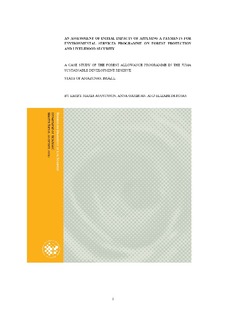| dc.description.abstract | The concerns related to global climate change have resulted in the formulation of new mechanisms concerning environmental governance. Payments for Environmental Services (PES) are one of these tools; however the implications of introducing such methods are not yet fully understood. In the context of REDD, Brazil has a lot of potential for the successful implementation of PES-based programmes. This has led to the creation of a PES-based project, the Forest Allowance Programme (BFP), which is currently operating in 14 protected
areas in the Amazon State, under the management of the non-governmental Sustainable Amazonas Foundation (FAS).
The introduction of monetary incentives can alter local dynamics, and the implementation of the programme thus requires a thorough understanding of local institutional settings in order for the desired objectives to be achieved. Institutional theory regarding rationality and normative behaviour must also be taken into account, in order to avoid adverse outcomes.
The study area of the Juma Sustainable Development Reserve in the Amazon State was chosen as it is currently one of the sites of the implementation of the BFP, which is at present the only internationally certified project in Brazil aimed at rewarding the forest communities for protecting their resources. We looked at possible indicators, such as changes in agricultural practices, income level, awareness of the environmental protection, and others,
which could reveal shifts in attitudes, motivation and behaviour resulting from the introduction of the programme. The field data was collected via household questionnaires with the residents of the reserve and interviews with programme facilitators, as well as by informal group discussions, and direct field observations.
The results reveal that the recent implementation of the BFP makes estimating the potential effects and costs of the project a challenge. Minor changes in behaviour and attitudes were observed, however the results could not be clearly attributed to the introduction of the programme and the financial incentives. The findings suggest that other incentives besides the monetary one, such as education efforts, are likely to have a stronger effect and will also be
more long-lasting. The programme also seems to have a positive role in reinforcing the functioning of the reserve, through encouragement of monitoring and control among the participants, as well as through ensuring the continued presence of forest dwellers in the area, thus minimising the risk of external deforestation threats. | en_US |
